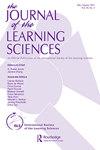“We got so much better at reading each other’s energy”: Knowing, acting, and attuning as an improv ensemble
IF 3.9
1区 教育学
Q1 EDUCATION & EDUCATIONAL RESEARCH
引用次数: 0
Abstract
ABSTRACT Background Long-form dramatic improvisation has been investigated as an accomplishment of emergent creativity among an ensemble of “players,” focusing on how the group achieves “group flow” in performance. Methods This article employs ethnographic methods (focus group, interviews, and video-assisted self-interviews) to investigate the case of a musical theater improv group. The analysis focuses on how the group describes its shared modes of knowing, drawing on the group’s history and their interpreted enactment of these modes in an improvised scene. Findings Improvisation in this group requires two inter-related forms of knowing: Shared Social Practice (SSP) and Collaborative Affective Attunement (CAA), where SSP involves definable repertoires, resources, conventions, and techniques, and CAA involves affective sensibility of in-the-moment responding, or affective attunement. These two forms of knowing develop over the course of a group’s history and are entangled in complex ways over the course of performance. Contribution Through a case study of a musical theater improv ensemble, the paper contributes to ongoing efforts to theorize the relationship between embodied experience, social practice, and affect in group knowing with special consideration for the significant role of collaborative affective attunement.“我们能更好地解读彼此的能量”:作为一个即兴表演团体,彼此了解、表演和协调
摘要背景长形式的戏剧即兴表演被研究为一种“演奏者”合奏中突发创造力的成就,重点关注群体如何在表演中实现“群体流”。方法采用民族志方法(焦点小组法、访谈法、视频辅助自访法)对某音乐剧即兴团体进行调查。分析的重点是该群体如何描述其共享的认知模式,借鉴该群体的历史,以及他们在即兴场景中对这些模式的解释。这个群体的即兴表演需要两种相互关联的认识形式:共享社会实践(SSP)和协作情感协调(CAA),其中SSP涉及可定义的曲目、资源、惯例和技术,而CAA涉及即时反应的情感敏感性,或情感协调。这两种认知形式是在一个群体的历史进程中发展起来的,并且在表演过程中以复杂的方式纠缠在一起。通过对一个音乐剧即兴合奏团的案例研究,本文为理论化体现经验、社会实践和群体认知中的情感之间的关系做出了贡献,并特别考虑了协作情感调谐的重要作用。
本文章由计算机程序翻译,如有差异,请以英文原文为准。
求助全文
约1分钟内获得全文
求助全文
来源期刊

Journal of the Learning Sciences
Multiple-
CiteScore
10.70
自引率
5.30%
发文量
17
期刊介绍:
Journal of the Learning Sciences (JLS) is one of the two official journals of the International Society of the Learning Sciences ( www.isls.org). JLS provides a multidisciplinary forum for research on education and learning that informs theories of how people learn and the design of learning environments. It publishes research that elucidates processes of learning, and the ways in which technologies, instructional practices, and learning environments can be designed to support learning in different contexts. JLS articles draw on theoretical frameworks from such diverse fields as cognitive science, sociocultural theory, educational psychology, computer science, and anthropology. Submissions are not limited to any particular research method, but must be based on rigorous analyses that present new insights into how people learn and/or how learning can be supported and enhanced. Successful submissions should position their argument within extant literature in the learning sciences. They should reflect the core practices and foci that have defined the learning sciences as a field: privileging design in methodology and pedagogy; emphasizing interdisciplinarity and methodological innovation; grounding research in real-world contexts; answering questions about learning process and mechanism, alongside outcomes; pursuing technological and pedagogical innovation; and maintaining a strong connection between research and practice.
 求助内容:
求助内容: 应助结果提醒方式:
应助结果提醒方式:


